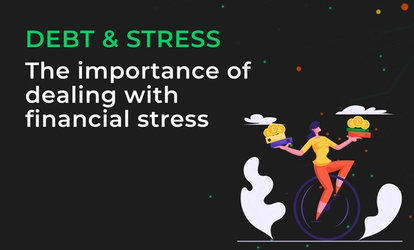The importance of dealing with financial stress

Financial stress can significantly impact the quality of our lives, affecting our bank accounts and our emotional wellbeing. Maintaining a healthy budget and navigating the many challenges of your finances is difficult at the best of times, but with record inflation and a rampant cost-of-living crisis, avoiding financial stress is more difficult than ever.
Right now, the pressures brought on by the cost-of-living crisis are increasing the impact of other sources of financial stress. For many people, the fear of losing their job, managing debt, or being saddled with unexpected costs, such as a car breaking down or home appliances needing to be replaced, may be mounting. Financial stress like this can cause anxiety and lead to irrational decision-making, which can increase financial hardship.
It’s important to remember that managing your finances can be difficult and that anxiety and pressure make it harder to manage money effectively. However, a two-fold strategy for combatting financial stress is taking care of yourself and your money.
Looking after yourself
Taking care of yourself is essential when dealing with financial stress. Stress comes from many sources; some can be addressed, while others cannot. Most financial problems have financial solutions, but managing financial stress starts with our emotional and physical well-being.
Taking care of yourself physically can reduce the risk of stress wearing you down. Additionally, seeking help from family, friends - and trained professionals where necessary - is advisable. Although money can be taboo, keeping financial concerns to yourself can increase stress – being open and honest can provide valuable perspective.
To manage and reduce the impact of stress, it’s important to take practical steps to support wellness. These include getting enough sleep, staying hydrated, and exercising regularly. This might seem like unusual advice to receive from a bank, but financial stress is a significant problem and looking after yourself should be your priority.
Taking care of your finances
Taking care of your money is another essential step in combating financial stress. Developing and maintaining a robust strategy is critical to managing your finances effectively. The good news is that many tools and services make it easy.
Firstly, it is crucial to account for your finances fully: calculating essential costs such as rent, food, and utilities. From there, you should plot out your goals and establish a saving plan to reach them – this could be paying down debt, saving for a house or establishing a savings buffer to mitigate unforeseen events. Finally, you must develop a realistic budget and – most importantly – stick to it. This will help you stay on track with your finances and avoid overspending - a common source of stress.
Another important step in minimising financial stress is working towards better overall financial health. One important step in financial health is making regular payments to pay down debt and build credit scores. There are many factors that can influence your credit score, but regular payments, responsibly using several lines of credit, and avoiding going over limits can further increase your chances of being approved for credit in the future. This can lead to lower interest rates and better terms on loans and credit cards, which can ultimately save you money in the long run.
Paying off overdrafts is another crucial aspect of improving financial health. Overdraft fees can add up quickly and can be a major source of stress for many consumers.
Finally, ensuring you make the most of savings is also important, particularly in the current climate where inflation is eroding the spending power of your money. For those in a position to put a lump sum of cash away and allow it to grow, products like SmartSave’s fixed-term, fixed-rate savings accounts can boost the value of your savings and provide you with added peace of mind when planning for the future.
Don’t stress
Financial stress can be a problem for anyone, but it can also be addressed. Taking care of yourself and your finances can reduce financial stress and alleviate its impact on your mental health.
Remember, taking care of your finances is a process, and it takes time, patience, and perseverance to achieve your financial goals. Follow the above steps, and you'll be well on your way to a financially healthy life.
For free, unbiased financial advice, go to Money Helper
- For advice on managing debt, go to StepChange Debt Charity
- You can obtain your score for free from Experian, Equifax and TransUnion*.
*There are three main Credit Reference Agencies (CRAs), and each will calculate your score slightly differently.





